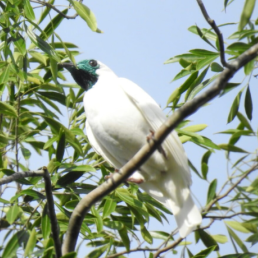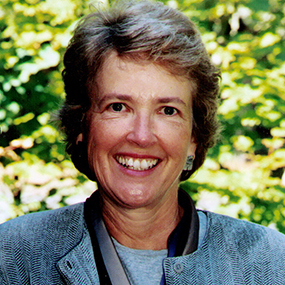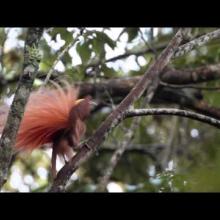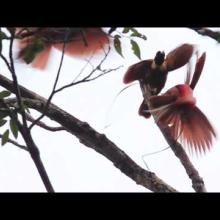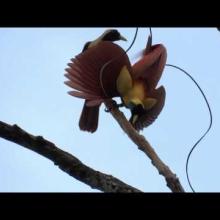

Join BirdNote tomorrow, November 30th!
Illustrator David Sibley and actor H. Jon Benjamin will face off in the bird illustration battle of the century during BirdNote's Year-end Celebration and Auction!
In the remote Central Highlands of Papua New Guinea, tropical biologists Ben and Alexandra Freeman are inventorying birds on Mount Karimui. The Freemans want to know which birds are living where, and why -- birds like the Raggiana Bird-of-Paradise and the King of Saxony Bird-of-Paradise. By design, their survey repeats work done in 1965 by ornithologist Jared Diamond. Since then, the temperature there has warmed about one degree Celsius. Could that temperature increase cause birds to shift the elevations they inhabit? Would a given species stay within its preferred thermal zone by shifting up-slope on the mountain? What they learn could have implications for birds, food crops, and people, on tropical mountainsides around the world.
BirdNote®
Ben and Alexandra Freeman Follow in Jared Diamond’s Footsteps
Interview by Chris Peterson
This is BirdNote!
[Ribbon-tailed Astrapia, Papua New Guinea]
In the remote Central Highlands of Papua New Guinea, villagers sing of birds in the forest that show people the way. [Continue Ribbon-tailed Astrapia] Tropical biologists Ben and Alexandra Freeman are there now, inventorying birds from four to eight thousand feet along a steep trail on Mount Karimui. They’re using mist nets, like fine fishing nets, to catch and document the birds, and release them unharmed. Here’s Alexandra:
“…We’re trying to survey the diversity of things as you move up a slope, in a line, all the way up from the bottom to the top.”
The Freemans want to know which birds are living where, and why; birds like this Raggiana Bird-of-Paradise [lekking sounds of Raggiana Bird-of-Paradise].
By design, their survey repeats work done, in 1965, by ornithologist and author, Jared Diamond. Since then, the temperature there has warmed about one degree Celsius. Here’s Ben:
“So we were interested in whether that temperature increase would cause birds to shift the elevations that they inhabit. So if you make everything a bit warmer, if a given species were to stay within its preferred thermal zone, it should respond by shifting up-slope on the mountain.”
Is that happening? Well, it’ll be a year or more before the Freemans compare their findings to the baseline established by Diamond. What they learn could have implications for birds, food crops and people, on tropical mountainsides around the world.
There’s more to this story at birdnote.org.
[Repeat Raggiana Bird-of-Paradise]
###
Sounds of the birds provided by The Macaulay Library of Natural Sounds at the Cornell Lab of Ornithology, Ithaca, New York. Ribbon-tailed Astrapia and Raggiana Bird-of-Paradise recorded by Eleanor Brown.
Producer: John Kessler
Executive Producer: Chris Peterson
© 2013 Tune In to Nature.org January 2013 Narrator: Mary McCann
ID# freemanba-01-2013-01-08 freemanba-01 Interview recorded September 17, 2012
